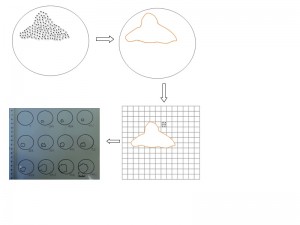Posted on June 12, 2014 by Jennifer Suh
Bacteria Growth

Bacteria describe a group of microorganisms that can be found distributed through the air, soil, water, and on a variety of surfaces handled by human beings. Some bacteria have been known to cause disease. To further study these unicellular organisms, laboratory cultures are made and measured for activity and growth. Bacterial growth occurs at an exponential rate; e.g. some bacteria doubles every 20 minutes. This means reproduction occurs rapidly, and the rate of growth can be calculated by recording the number of bacteria over short intervals of time. When grown in a Petri dish, bacteria can be seen in small colonies, and the area of these colonies can be recorded as a representation of the growth.
Bacteria Activity_Guide
Filed under: Uncategorized | | No Comments »
Posted on October 18, 2012 by Jennifer Suh
ESTEEM for 21st Century Literacy: Expeditions in Science, Technology and Engineering Education through Mathematics for 21st Century Literacy is partnership between Faculty from George Mason University (GMU) and three school divisions in Northern Virginia (Fairfax County, Manassas City and Prince William County). The proposed GMU ESTEEM program will provide a great opportunity to directly reach and impact several students and teachers in the Northern Virginia schools through GMU’s existing collaborations and partnerships to:
- Engage students and teachers in inquiry-based 21st Century Literacy Skills focused on STEM instruction with mathematics, scientific investigation, engineering design, mathematical analysis and problem solving, and appropriate technology;
- Enhance group dynamic capabilities of middle school students and teachers working together thinking critically to solve real-world problems that focus on 21st Century Skills including the 4 Cs: critical thinking, communication, collaboration and creativity;
- Impact students and teachers through high quality professional development (through summer institutes and follow up seminars and content-focused coaching through Lesson Study) and GMU e-learning Network (content-focused webinars, video clips and research lessons in math and science as exemplars that align with the SOL standards)that enhances teaching practices;
- Provide targeted opportunities for meaningful STEM learning to underrepresented populations through ESTEEM clubs to increase the academic achievement, family advocacy and opportunities through mentoring with teachers, Undergraduate Mentors and career readiness in STEM Initiatives.
Filed under: Uncategorized | | 1 Comment »
